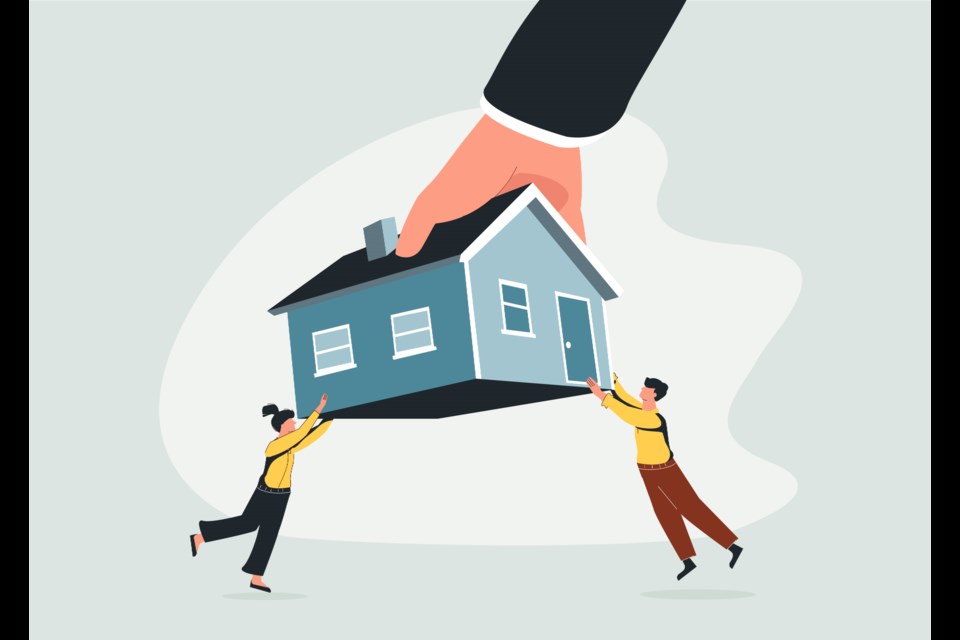Despite all the announcements on housing affordability from the new David Eby government in Victoria, a recent report by one of Canada’s largest banks shows things on the ground have never been worse.
RBC’s latest “Housing Trends and Affordability” note paints a stunning picture of both the income needed to qualify for a mortgage in Vancouver, and the amount needed to pay that mortgage, as rising interest rates worsen the previously existing housing crisis in much of British Columbia.
“Canada’s least affordable market got worse,” writes RBC in its Vancouver section, along with how the area is “setting a new (grim) record.”
“The spike in interest rates further inflated the area’s gigantic ownership costs in the third quarter… owning a home has never been so unaffordable anywhere in Canada ever – and probably most places around the world.”
You’d need a pre-tax household income of at least $268,000 to buy a typical home in Metro Vancouver these days, according to the report. The figure, which is the highest in Canadian history, is “astounding,” according to the bank.
Even though housing prices have dropped slightly in a few areas, the Bank of Canada’s decision to hike interest rates four percentage points in 2022 has made it overall significantly more expensive to afford the borrowing cost of buying a home.
Income levels to housing costs are becoming absurd. A person in Metro Vancouver with a typical salary would have to pay 95.8 per cent of their pre-tax income toward their mortgage on an average home.
“What was already a very tough hurdle to clear is now nearly impossible for many potential purchasers,” wrote RBC.
“No wonder homebuyer demand has plummeted since the Bank of Canada initiated its rate hike campaign.”
The situation is just as bad in Greater Victoria, where someone would need to earn at least $216,000 to qualify to buy.
“These levels widely exceed the respective median household income,” according to RBC.
“In other words, it’s Canadians in the upper income echelons who can afford an average home in these markets.”
It’s a report full of the kind of figures that should alarm B.C. New Democrats.
The NDP has tried desperately to stake out a position of having done something about housing affordability during its first five years in office, as well as the first two months under Eby.
Yet it is clear though that nothing – from a speculation tax, to a money-laundering crackdown, to a larger property wealth tax, to cooling-off periods on home purchases – has resulted in any meaningful improvement to affordability, either before or after the Bank of Canada’s decision to drive up interest rates.
“No doubt the interest rates have a big part to play in the prices and where the housing goes,” said Housing Minister Ravi Kahlon.
“But we also have a major challenge, and that is we are not building enough units, and we’re taking way too long to approve them. So that's why supply and speed are major priorities for me.
“The premier has asked me to put together a housing strategy so that we can highlight and in particular address those two key challenges, which I do think if we get them right will bring the price down to a level where more people are able to afford it.”
In the meantime, record-high unaffordability leaves the NDP with limited ability to point to any success on what polls indicate is one of the most important files for voters.
“It demonstrates the housing policies that we’ve got in place right now are grossly inadequate, and they’re not working,” said Opposition BC Liberal housing critic Karin Kirkpatrick.
The new affordability report plays well for the Liberals, whose repeated calls for the NDP to show “results” in areas of affordability, housing and health care have proven effective attacks against the government’s credibility.
That’s not to say Eby has been idle on the issue.
His law to force municipalities to speed up approvals for new housing may one day bear fruit in the form of more supply – it’s just unlikely to do so in a meaningful way within 18 months, when his government next heads to the polls. And the premier’s new $500 million fund to protect existing rental buildings dovetails well with news the province saw the highest-ever amount of purpose-built rental housing last year.
Still, the NDP’s wider efforts on constructing housing have also fallen well short of promises. The government pledged to build 114,000 new units over 10 years. So far, past the half-way point, barely 12,000 are actually open.
It’s not clear how bad things will continue to get on housing affordability in 2023. Even the bank’s report admits it’s unsure exactly how the year will play out, and what will happen to rates.
But the figures so far don’t lie. Whether the NDP likes it or not, it’s never been less affordable to buy a home in this province. And it doesn’t look like that’s getting any better, any time soon.
Rob Shaw has spent more than 14 years covering B.C. politics, now reporting for CHEK News and writing for Glacier Media. He is the co-author of the national bestselling book A Matter of Confidence, and a regular guest on CBC Radio.



